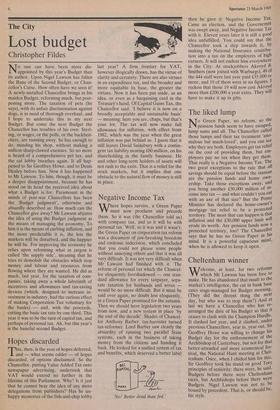Negative Income Tax W here hopes survive, a Green Paper must
now proclaim and precede them. So it was (the Chancellor told us) with company tax, and so it will be with personal tax. Well, so it was and it wasn't: the Green Paper on corporation tax reform was a document of jaw-breaking boredom and endemic indecision, which concluded that you could not please some people without annoying others and that it was all very difficult. It was not very difficult when Mr Lawson had finished with it. The reform of personal tax which the Chancel- lor eloquently foreshadowed — one stan- dard allowance for every taxpayer, sepa- rate taxation for husbands and wives would be no more difficult. But it must be said over again, no doubt less eloquently, in a Green Paper promised for the autumn. Then we should have legislation two years from now, and a new system in place 'by the end of the decade'. Shades of Chancel- lor Anthony Barber, tax-barrister turned tax-reformer. Lord Barber saw clearly the absurdity of running two parallel State systems, each in the business of taking money from the citizens and handing it back. He looked for a unified system of tax and benefits, which deserved a better label 'No! Better dead than fed.' then he gave it: Negative Income Tax. Came an election, and the Governemnt was swept away, and Negative Income Tax with it. Eleven years later it is still a good idea unfulfilled. You could say that the Chancellor took a step towards it, by making the National Insurance contribu- tion into a tax on the employers of high earners. It will not endear him everywhere in the City. At stockjobbers Akroyd Smithers (now joined with Warburgs), 49 of the 444 staff were last year paid £35,000 or more, and 19 of them were in six figures. I reckon that those 19 will now cost Akroyd more than £200,000 a year extra. They will have to make it up in gilts.














































 Previous page
Previous page